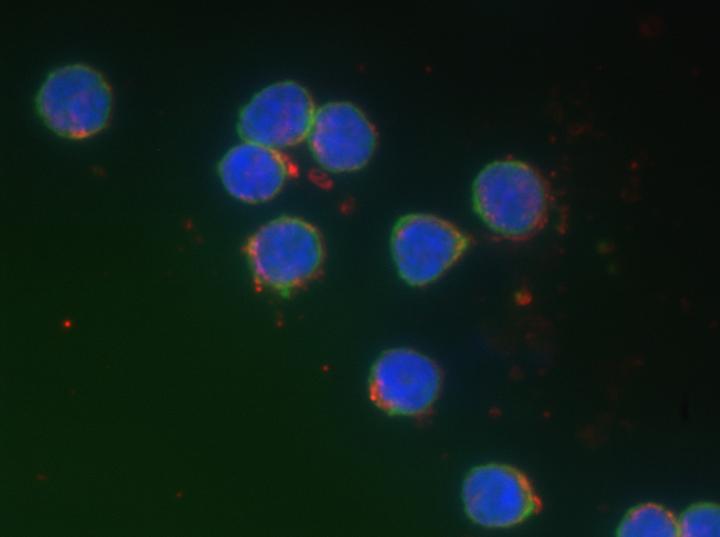By studying the effects of gold nanoparticles on the immune cells related to antibody production, researchers at UNIGE, at Swansea University and at the NCCR “Bio-inspired Materials” are paving the way for more effective vaccines and therapies.

Credit: © UNIGE
Over the past twenty years, the use of nanoparticles in medicine has steadily increased. However, their safety and effect on the human immune system remains an important concern. By testing a variety of gold nanoparticles, researchers at the University of Geneva (UNIGE), in collaboration with the National Centre of Competence in Research “Bio-inspired Materials” and Swansea University Medical School, (United Kingdom), are providing first evidence of their impact upon human B lymphocytes – the immune cells responsible for antibody production. The use of these nanoparticles is expected to improve the efficacy of pharmaceutical products while limiting potential adverse effects. These results, published in the journal ACS Nano, will lead to the development of more targeted and better tolerated therapies, particularly in the field of oncology. The methodology developed makes it also possible to test the biocompatibility of any nanoparticle at an early stage in the development of a new nanodrug.
Responsible for the production of antibodies, B lymphocytes are a crucial part of the human immune system, and therefore an interesting target for the development of preventive and therapeutic vaccines. However, to achieve their goal, vaccines must reach B lymphocytes quickly without being destroyed, making the use of nanoparticles particularly interesting. “Nanoparticles can form a protective vehicle for vaccines – or other drugs – to specifically deliver them where they can be most effective, while sparing other cells,” explains Carole Bourquin, a Professor at the UNIGE’s Faculties of Medicine and Science, who co-led this study. “This targeting also allows the use of a lower dose of immunostimulant while maintaining an effective immune response. It increases its efficacy while reducing side-effects, provided that the nanoparticles are harmless to all immune cells.” Similar studies have already been conducted for other immune cells such as macrophages, which seek out and interact with nanoparticles, but never before for the smaller, and more difficult to handle, B lymphocytes.
Gold is an ideal material
Gold is an excellent candidate for nanomedicine because of its particular physico-chemical properties. Well tolerated by the body and easily malleable, this metal has, for instance, the particularity of absorbing light and then releasing heat, a property that can be exploited in oncology. “Gold nanoparticles can be used to target tumours. When exposed to a light source, the nanoparticles release heat and destroy neighbouring cancer cells. We could also attach a drug to the surface of the nanoparticles to be delivered to a specific location,” explains UNIGE researcher Sandra Hočevar. “To test their safety and the best formula for medical use, we have created gold spheres with or without a polymer coating, as well as gold rods to explore the effects of coating and shape. We then exposed human B lymphocytes to our particles for 24 hours to examine the activation of the immune response.”
By following activation markers expressed on the surface of B cells, the scientists were able to determine how much their nanoparticles activated or inhibited the immune response. While none of the nanoparticles tested demonstrated adverse effects, their influence on the immune response differed depending on their shape and the presence of a surface, polymer coating. “Surface properties, as well as nanoparticle morphology definitely are important when it comes to the nanoparticle-cell interaction. Interestingly, the gold nanorods inhibited the immune response instead of activating it, probably by causing interference on the cell membrane, or because they are heavier”, says Martin Clift, an Associate Professor of Nanotoxicology and In Vitro Systems at Swansea University Medical School, and the project’s co-leader.
Uncoated, spherical particles easily aggregate and are therefore not appropriate for biomedical use. On the other hand, gold spheres coated with a protective polymer are stable and do not impair B lymphocyte function. “And we can easily place the vaccine or drug to be delivered to the B lymphocytes in this coating,” says Carole Bourquin. «In addition, our study established a methodology for assessing the safety of nanoparticles on B lymphocytes, something that had never been done before. “This could be especially useful for future research, as the use of nanoparticles in medicine still requires clear guidelines.”
Many clinical applications
B cells are at the heart of vaccine response, but also in other areas such as oncology and autoimmune diseases. The gold nanoparticles developed by the team of researchers could make it possible to deliver existing drugs directly to B lymphocytes to reduce the necessary dosage and potential side effects. In fact, studies in patients are already being carried out for the treatment of brain tumours. Gold nanoparticles can be made small enough to cross the blood-brain barrier, allowing specific anti-tumoural drugs to be delivered directly into the cancerous cells.
###
Media Contact
Carole Bourquin
[email protected]
Related Journal Article
http://dx.




